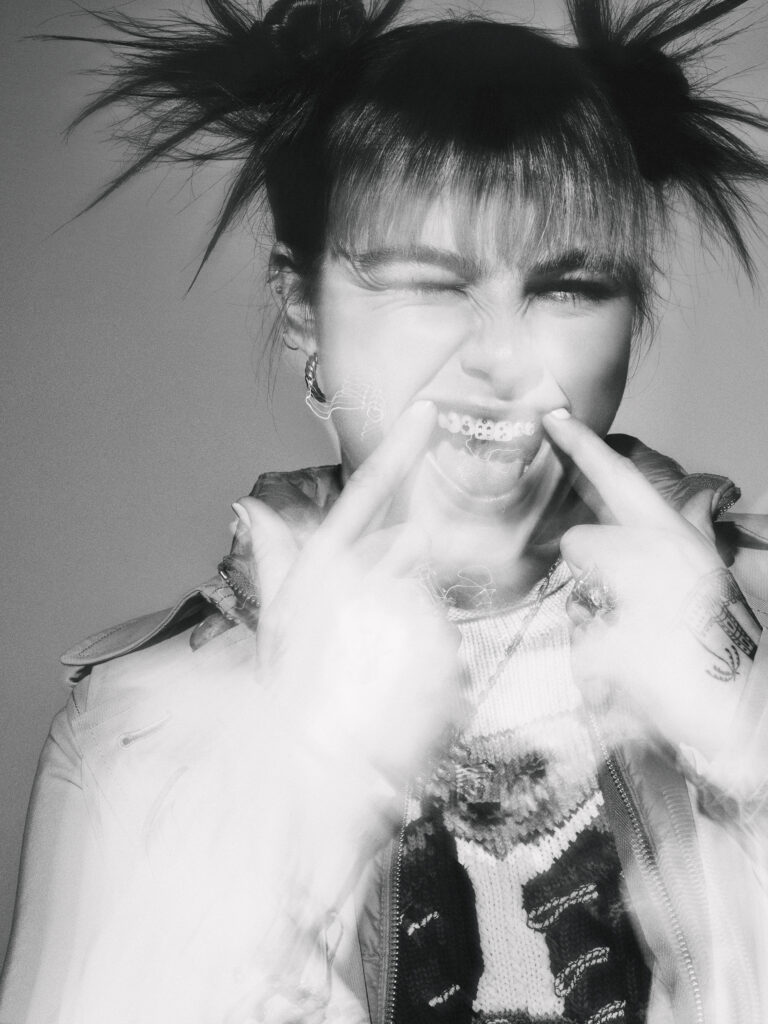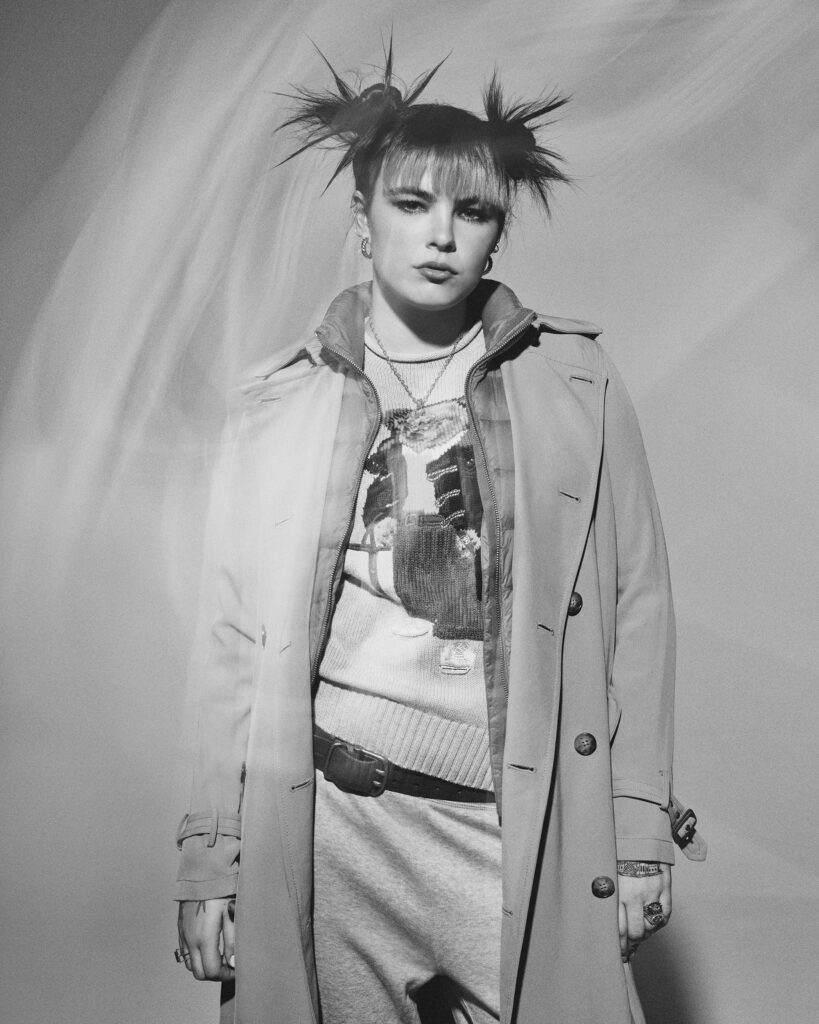“That was a waste of fucking time / You were a waste of fucking time,” New Zealand-born singer BENEE exclaims in the opening lines of her latest anthemic single “Green Honda.” She goes on to scold a past lover “All your friends are fucking fake / They’re all too boring and too straight / I cringe at everything they say.” For BENEE, the song is a departure from her previous repertoire of dreamy, alt-pop hits. But it also shows an artist outside her comfort zone, one that is undaunted by change.
Born Stella Rose Bennett, BENEE’s Auck- land upbringing was awash in creativity—from her parents’ catalog of Björk and Radiohead to her guitar and saxophone lessons. After working at a pizza joint and dropping out of college after two weeks in what she called “a quarter-life crisis,” BENEE did what many teens do: take to the internet. She posted covers on Sound- Cloud which, much to her surprise, garnered positive reception and the attention of producers. “I got a good response,” she shares. “I was like, ‘Do people want to hear my voice?’ I managed to get into the studio, and I just loved it. I had that passion for music, but never thought that it would be something I could pursue.”

A few projects later, BENEE’s charismatic track “Supalonely” was a turning point for the artist. Released at the tail end of 2019, the Gus Dapperton-supported song took off exponentially during the height of COVID lockdowns— perhaps due to the reflective nature of the song and lyrics like “I’m a lonely bitch.” Natu- rally, like much of popular culture nowadays, the track earned most of its traction on TikTok, where users created a snappy dance to back BENEE’s airy vocals. BENEE admits she never learned the dance, but was stunned in the best way by the rapid success of the song: “I definitely didn’t know that [“Supalonely”] was gonna be a hit. It was a new style for me, but I was just so excited people would be hearing it,” the artist explains.
While “Supalonely” skyrocketed, BENEE was unable to enjoy the expected fruits of its success—touring, traveling, promotion—due to travel restrictions. It was bittersweet for the singer, but the time confined in New Zealand made her recent touring all the more special. The artist also made the move to Los Angeles and she played her biggest show yet at Coachella this year.
Moving to LA has allowed BENEE to tap into the city’s extensive repertoire of producers and mixers for new ventures. On “Green Honda” she worked with an all-female team for the first time, alongside producers Elvira Anderfjärd and Luka Kloser, who both generated an environment that allowed BENEE to be more unrestrained: “I instantly felt comfortable. I felt like being a bad bitch. I was like, ‘I’m with my girls and I’m gonna swear and say some in the session.’” After our conversation, she headed to the studio to work on her forthcoming album, a follow-up to her 2020 full-length debut, Hey u x. When I ask if the green Honda is coming with her, she jokes, “She stayed in New Zealand, unfortunately. I don’t think I’d trust her on these streets. She’s got a one-star safety rating.”
For more on BENEE’s creative process, musical upbringing, and future plans, read below.

V: I wanted to ask you how Benee was born. I know you were always very artistic and in the music scene, what made you want to music professionally?
BENEE: I was in my last year of high school in 2017. And that when you get all of this pressure of “Do I have to know what I wanna do right now?” I thought I was gonna go and get this degree and I went for like a week, literally a week. And then sometimes you just feel with your gut that something doesn’t feel right. I have to listen to myself, because sometimes it’s the best thing that I’ve ever done. And sometimes it’s, whatever.
But I started releasing covers on SoundCloud, not really thinking anything of it, just because I loved singing. I would always play around with GarageBand on my mom’s MacBook. So that would always be in the kitchen. And I posted these covers onto SoundCloud and it was a moment where I was cringing at myself and I was like, “I don’t really wanna do this. “And I was like, “You know what? This is what people do all the time on YouTube and people love it.” You just have to put yourself out there and break that. And then it’s just like, bring it on. Let’s just put it out and don’t care about what happens. I think that you have to get used to becoming really vulnerable with music.
But I did that and then I got a really good response from my community then I was like, “What the fuck? People actually want to hear my voice?” And I actually managed to get into the studio with Josh Fountain, who I still work with. He wanted to do a session after listening to one of the recordings that I had uploaded. And I did the session and then we did a couple more and I was just like, “This is the coolest thing I’ve ever done.” I just loved it so much. I feel like I already had that passion for music, but just never really thought that it would be something that I could pursue and support myself with.

V: “Supalonely” was one of those first songs you put out, and it became such a hit. When you were making that song, did you think it was going to blow up like it did? And obviously being in lockdown, what was it like seeing the success of the song but not being able to tour or perform it?
B: I definitely didn’t know that it was gonna be a hit. It’s so weird with songs because I feel like the ones that you think will do well are usually the ones that don’t. I feel like it’s a weird system and no one actually knows what song will go off. But it was a really new kind of style for me. And it felt so me at the time that I was so excited about it and happy that people would be hearing it.
V: Visuals and performance are a really big part of your music. When you were kind of finally able to tour and sing these songs, what was that like? And what do you enjoy about performing in general?
B: Yes, I love performing. Performing brings such a different life to a song. I also feed off like the energy that you receive from a crowd. And being able to tour, even before COVID, we were touring and that was pretty freaking insane. But then after COVID, it’s completely different. I don’t know what feels different, but it’s also the same. It made you realize when we couldn’t play shows how important it is for us to play shows. I know some musicians who don’t like performing, and just music making is what they love.

But for me, I realized that it’s completely 50-50. I love writing and recording songs, but I also like being on the road and connecting with your audiences and playing new songs. And I guess even playing songs before they get big and then playing them after they’re big is also a crazy experience. Each song has its own little life and by playing all these shows and songs, you realize what connects to people and you understand people more.
V: “Green Honda” feels like almost a new sound for you in some ways. What did you want to say with this song and what was it like in the process?
B: I made “Green Honda” with two women, which is actually a big deal because there are so many men in production and the industry. I love working with men as well but it is nice to work with women, it’s a different kind of connection that you have in the studio. I just instantly felt comfortable, I felt like a “I’m a bad bitch with my girls and I’m gonna swear and say some shit in the session.” That was with Luka Kloser and Elvira Anderfjärd. Elvira is from Sweden, so you can definitely hear that Swedish pop influence there. I’ve always wanted to have an element of surprise.
It is funny how when you release a song that sounds a little bit different to your other stuff, people freak out, some in a good way and some are like, “Oh my God, no. We want old Benee back.” I’m like “Guys, okay chill.” I don’t wanna stick to any genre, and I feel like this is definitely a different sound for me. But I’m working on an album that will be filled with a lot of different sounds. For the album, I don’t really have a direction. I feel like most people have a concept album, but I’m trying to find out the concept. I’m trying to navigate my way through this thing. But it was really fun making that song and I love how intense it is and it really doesn’t sound like my other music, but I like that about it.

V: You recently moved to Los Angeles and have a new album in the works. What can we expect from you with this new album? What are you looking forward to?
B: Making the move to LA has been really exciting for me because there are so many people that I love here who I can work with. The album is gonna be really colorful and collaborative, I feel like it’s the next chapter of my life. I really feel like I’m in a new era of living and that will obviously reflect on the art that I start making. And I’m doing a session today. I’ve been doing sessions this week and they feel really good. So I don’t know what to expect with the album, but I know it’s gonna be good. I just need to make it good. Like I need to make it really good . I feel like the last album that I released I rushed the process of getting it out because of the timing of things. It was an awkward life thing where COVID had just happened and then I released the album. So now I feel like it’s a nice, new fresh slate and I’m gonna go slow with it so that I can make it everything that I want to be without rushing it.
Stream “Do It Again” below.
This feature appears inside the pages of V143: now available for purchase!
Photography Dennis Leupold
Fashion Matthew Mazur
Makeup Lilly Keys (A-Frame)
Hair Clayton Hawkins (The Visionaries)
Production Vanessa Vossen (Art Department)
Digital Technician Kevin Leupold
Editorial Direction & Casting Czar Van Gaal
Editor Kala Herh
Photo assistant Marco Bravo, Allison Lopez
Stylist assistant Nia Shambourger
Makeup assistant Elaina Karras
Hair assistants Sydney Staehle
Retouching Venus PP
Location Dust Studios
Discover More






